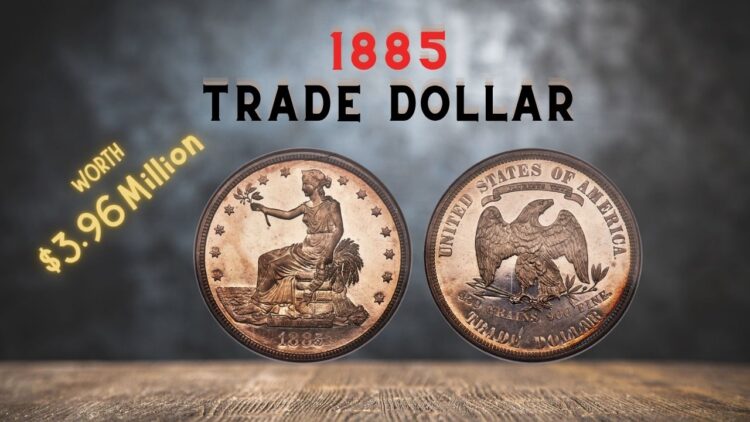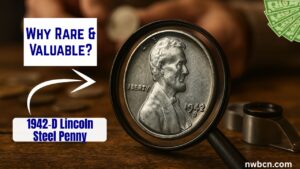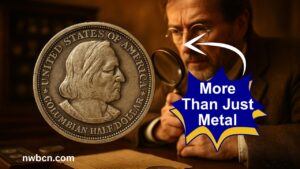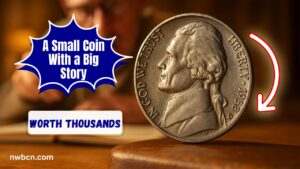The 1885 Trade Dollar stands as one of the most mysterious and prized coins in U.S. numismatic history. Disappearing for nearly a century after being struck, this coin emerged as a record-breaking treasure.
This article explores the full story behind the 1885 Trade Dollar, how it remained hidden for decades, its reappearance, and why it fetched an astounding $3.96 million at auction.
Understanding the U.S. Trade Dollar
The U.S. Trade Dollar, introduced in 1873, was specially minted for international commerce, particularly with East Asia. It was designed to compete with the Mexican peso, a popular coin in Chinese markets.
- Weight: 420 grains (27.2 g)
- Composition: 90% silver
- Design: Featured Lady Liberty seated on the obverse and an American bald eagle on the reverse
- Engraver: William Barber
Trade Dollars often bore chop marks—Chinese merchants’ stamps authenticating the coin’s silver content during transactions.
The Mystery of the 1885 Trade Dollar
By 1878, the U.S. Mint had stopped producing Trade Dollars for circulation. However, proof versions continued for collectors, with 1885 marking the final and most enigmatic issue.
- No official mint records exist for the 1885 Trade Dollar
- Believed to be struck in secret at the Philadelphia Mint
- Only five confirmed examples exist today
These factors have created a sense of myth and reverence around the 1885 issue, making it among the rarest coins in American history.
Known Specimens and Their Journey
Below is a table summarizing the key known specimens of the 1885 Trade Dollar and their appearances in the public domain:
| Year Appeared | Specimen / Pedigree | Sale Details |
|---|---|---|
| 1913 | First known example | First public appearance |
| 1954 | King Farouk specimen | Displayed in Cairo collection |
| 2004 | King Farouk-Norweb specimen | Sold for over $1 million |
| 2006 | Atwater specimen | Private sale at approx. $3.3 million |
| 2018 | Eliasberg specimen (PR66) | Sold for $3.96 million in 2019 |
Each coin has a rich pedigree tied to prominent collectors such as King Farouk, Eliasberg, and Norweb, adding to their historical value.
The Record-Breaking Auction
On January 10, 2019, the Eliasberg specimen of the 1885 Trade Dollar was sold at Heritage Auctions’ Platinum Night event.
- Grade: PR66, certified by NGC
- Buyer: Wealthy collector Dell Loy Hansen of Utah
- Sale Price: $3,960,000
This sale set a new record for the Trade Dollar series and reaffirmed the coin’s legendary status. Notably, none of the five known examples are held by major public institutions like the Smithsonian or American Numismatic Association, making them ultra-exclusive for private collectors.
Why Did It Disappear for a Century?
The 1885 Trade Dollar’s disappearance is likely due to a combination of secrecy and limited distribution.
- Possibly struck unofficially or quietly distributed by mint officials
- With no documentation in mint reports, the coin remained unlisted and unknown
- Rediscovered slowly through estate sales and auctions in the 20th century
This century-long mystery adds significantly to the coin’s aura and collectability.
What Makes It So Valuable?
Several factors contribute to the enormous value of the 1885 Trade Dollar:
1. Extreme Rarity
Only five specimens are confirmed to exist, making it one of the rarest American coins.
2. High Grade
The Eliasberg specimen holds a PR66 grade, the highest for this coin type.
3. Historical Pedigree
Owned by legendary collectors like Eliasberg, King Farouk, and Norweb.
4. Historical Significance
Represents the closing chapter of the U.S. Trade Dollar program and a clandestine minting story.
5. Numismatic Intrigue
With no official mint record and secretive production, the 1885 edition is a numismatic enigma.
Background of the Trade Dollar Program
The Trade Dollar program was rooted in U.S. economic strategy:
- Launched in 1873 to enhance silver trade in Asia
- Meant to compete with the Mexican peso, dominant in Chinese trade
- Lost legal tender status in the U.S. in 1876
- Production for circulation ended in 1878, but proof coins continued for collectors until 1885
The 1885 issue marks the end of this era—and remains the most sought-after of them all.
Summary Table: 1885 Trade Dollar Key Facts
| Attribute | Details |
|---|---|
| Year | 1885 |
| Type | Proof U.S. Trade Dollar |
| Known Examples | 5 confirmed specimens |
| Mint Location | Philadelphia (no official records) |
| Highest Grade | PR66 (Eliasberg specimen) |
| Record Sale | $3.96 million (2019, Heritage Auction) |
| Buyer | Dell Loy Hansen |
| Pedigree Collections | Eliasberg, King Farouk, Norweb, Atwater |
| Composition | 90% Silver |
| Weight | 27.2 grams (420 grains) |
| Edge | Reeded |
| Legal Tender Revoked | 1876 |
The tale of the 1885 Trade Dollar is more than just about money—it’s about mystery, legacy, and prestige. Its unrecorded minting, vanishing for a century, and eventual emergence to command nearly $4 million at auction solidify its status as one of the most coveted and enigmatic coins in the world.
For collectors, it represents the pinnacle of rarity, beauty, and historical importance. With only five in existence, and none in public hands, the 1885 Trade Dollar remains a legend that continues to inspire awe across generations of numismatists
FAQs
1. Why is the 1885 Trade Dollar so rare?
Only five known proof specimens were ever made, likely outside standard minting practices. With no official records and restricted distribution, these coins remained hidden for decades, adding to their rarity.
2. Who owns the most valuable 1885 Trade Dollar?
The finest-known example, graded PR66, was purchased by collector Dell Loy Hansen for $3.96 million in 2019.
3. Could more 1885 Trade Dollars be discovered?
While unlikely, it’s not impossible. However, due to their secretive origin and limited production, any new discovery would be monumental in the numismatic world.




